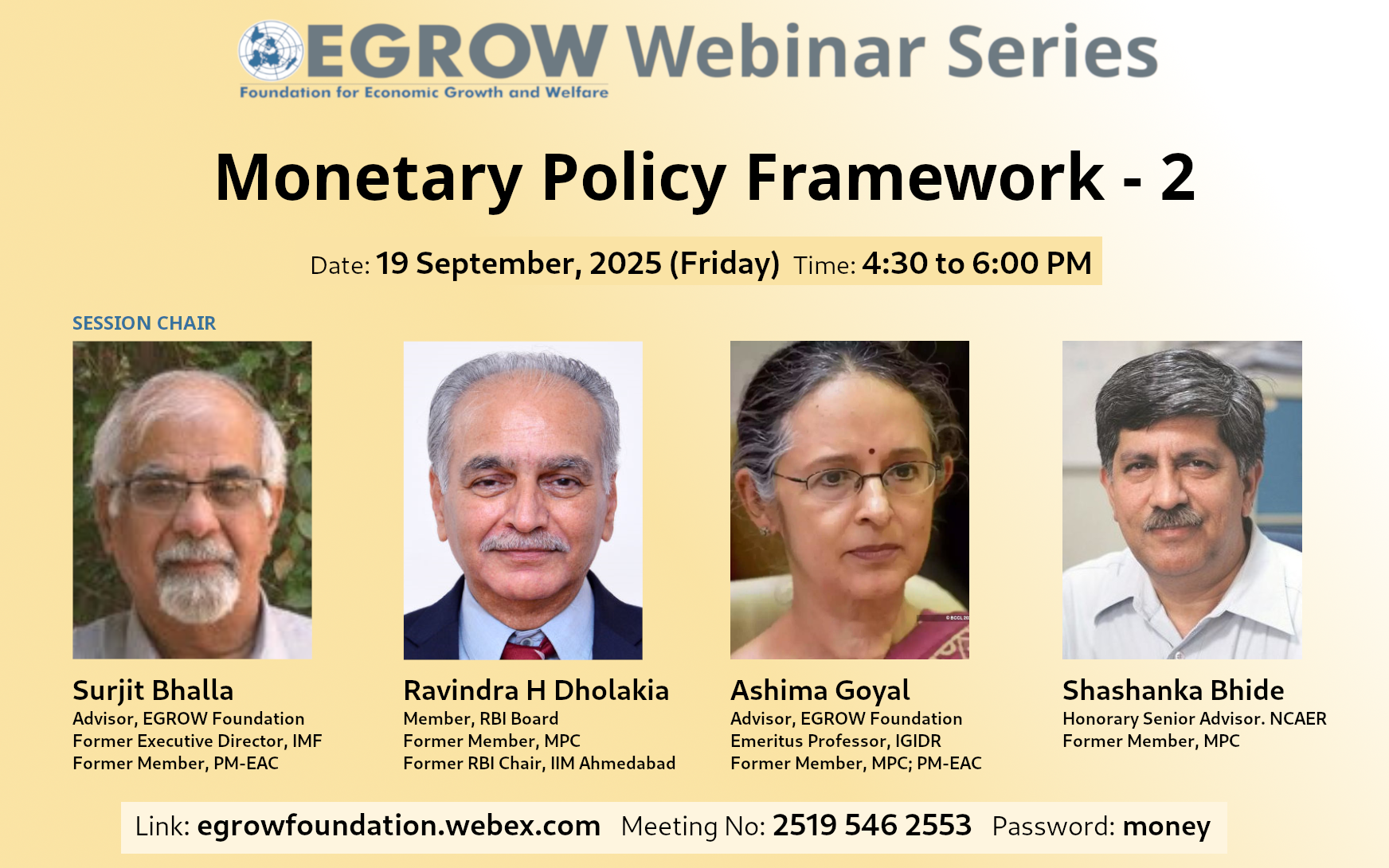Monetary Policy Framework - 2

Webinar Link
Meeting No: 2519 546 2553
Password: money
Certificate of Participants
To recieve certificates, please register and attend
Abstract
India’s monetary policy framework, adopted in 2016, is anchored in flexible inflation targeting, mandating the Reserve Bank of India to maintain inflation at 4% within a tolerance band of ±2%. The establishment of the Monetary Policy Committee enhanced transparency and accountability in decision-making. While the framework has largely succeeded in anchoring inflation expectations, recent shocks such as the COVID-19 pandemic, global commodity price volatility, and domestic food inflation have tested its resilience. Key challenges remain in strengthening monetary transmission, tackling supply-side pressures, and balancing growth with macroeconomic stability amid external spillovers. The RBI’s review of liquidity management and the rising influence of digital currencies and payment systems further complicate transmission dynamics. With the flexible inflation targeting regime due for review in 2026, debates continue on whether to retain the 4% midpoint, emphasize core inflation, or adopt a more flexible, counter-cyclical stance. This webinar will discuss its evolution, effectiveness, and future direction.
About the Speakers
Surjit Bhalla
Dr. S.S. Bhalla, is a Senior India Analyst for the Observatory Group, a New York based macroeconomic policy advisory firm and Chairman of Oxus Research & Investments. In 2017, he was appointed as Member of the Prime Minister’s Economic Advisory Council. He has been a member of the Secondary Markets Advisory Committee of SEBI and the National Statistical Commission of India. Dr Bhalla writes extensively on economic issues and has recently authored another book titled, The New Wealth of Nations.
Ravindra H Dholakia
Dr. Ravindra H. Dholakia, a retired Professor of IIM, Ahmedabad, has more than 38 years of experience in regional economic development, economic analysis and policy, international economics and health economics. Earlier, he has served as a consultant to State and Central governments, private sector institutions and international organizations such as WHO, UNICEF, ADB and World Bank. He has also been a member of various committees appointed by the Government and has more than 140 research papers and 22 books to his credit.He holds a post-doctoral research fellowship from the University of Toronto and a PhD in Economics from M S University, Baroda.
Ashima Goyal
Ashima Goyal is Advisor at EGROW Foundation. She has provided consultancy to ADB, DEA, GDN, UNDP, RBI, UN ESCAP and WB. She is active in the Indian policy debate; and has served on several government committees, including the Economic Advisory Council Prime Minister and the RBI technical advisory committee for monetary policy, and boards of educational and of financial institutions. She is former Member of RBI's Monetary Policy Committee, an independent director at Edelweiss Financial Services and SBI General Insurance.
Ashima Goyal edits a Routledge journal in macroeconomics and finance and contributes a monthly column to the Hindu Business Line. She was a visiting fellow at the Economic Growth Centre, Yale University, USA, and a Fulbright Senior Research Fellow at Claremont Graduate University, USA. Her research has received national and international awards. She won two best research awards at GDN meetings at Tokyo (2000) and Rio de Janeiro (2001), was selected as one of the four most powerful women in economics, a thought leader, by Business Today (2008); was the first Professor P.R. Brahmananda Memorial Research Grant Awardee for a study on History of Monetary Policy in India since Independence (2011), which was published by Springer in 2014; received the SKOCH Challenger Award for Economic Policy (2017); Hindu College OSA Distinguished Alumni Award and 20th FLO FICCI GR8 Beti Award for Excellence in Economics (2018).
Ashima Goyal is widely published in institutional and open economy macroeconomics, international finance and governance, with more than a hundred articles in national and international journals. She has also authored and edited a number of books including Macroeconomics and Markets in Developing and Emerging Economies (Routledge: UK. 2017) and A Concise Handbook of the Indian Economy in the 21st Century (OUP: India, 2019).
Shashanka Bhide
Shashanka Bhide is a Honorary Senior Advisor at the National Council of Applied Economic Research. NCAER. He was with NCAER from 1982 to 2014 in different capacities. He took up the position of Director, Madras Institute of Development Studies, Chennai in July 2014 and served in this position until December 2018. He joined NCAER in the present position in September 2019. His research has covered a number of areas in agriculture, macroeconomic modeling, infrastructure, and poverty analysis. He has published extensively, including co-authoring and editing books and journal articles in these fields. During 2003 – 2004, while on leave from NCAER, he was Professor at Social and Economic Change in Bangalore.
His research interests include applied economic analysis in a range of areas covering agriculture, poverty analysis, macroeconomic modelling and infrastructure development. He has published his research in academic journals, books and other media. His recent co-edited books include ‘Poverty, Chronic Poverty and Poverty Dynamics, Policy Imperatives’, Springer, 2018 and ‘Deciphering India’s Services Sector Growth’, Routledge, 2021.